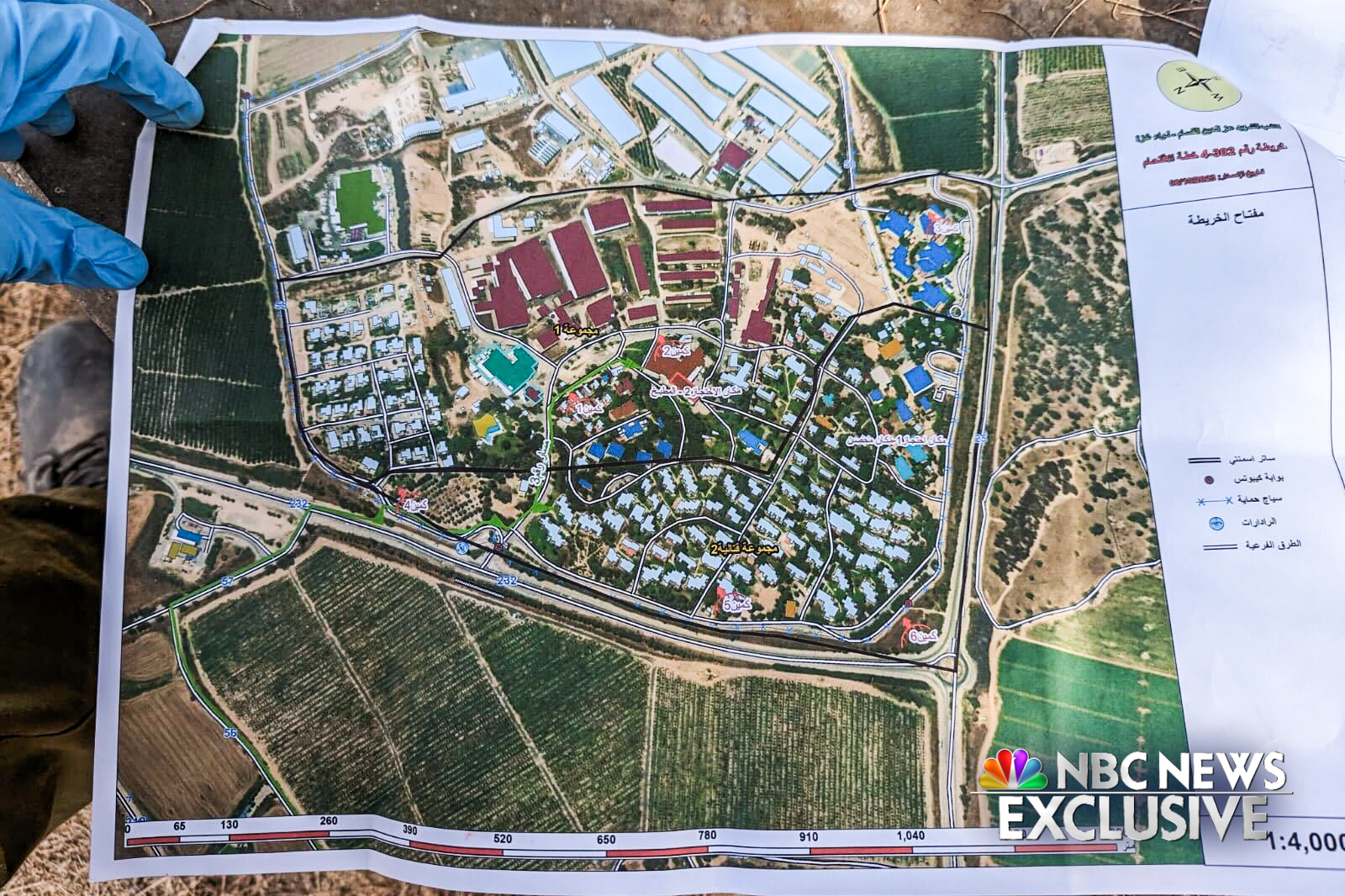Gaza’s 2.3 million civilians faced a deepening struggle for food, water and safety Sunday and braced for a looming invasion a week after Hamas militants launched a deadly assault on Israel. While hundreds of thousands sought to heed Israel’s order to evacuate the north, others huddled at hospitals there.
Israeli forces, supported by a growing deployment of U.S. warships in the region, positioned themselves along Gaza’s border and drilled for what Israel said would be a broad campaign to dismantle the militant group. A week of blistering airstrikes have demolished entire neighborhoods but failed to stem militant rocket fire into Israel.
WATCH ANYTIME FOR FREE
>Stream NBC10 Boston news for free, 24/7, wherever you are. |
The Gaza Health Ministry said 2,329 Palestinians have been killed since the fighting erupted, more than in the 2014 Gaza war, which lasted over six weeks. That makes this the deadliest of the five Gaza wars for both sides. More than 1,300 Israelis have been killed, the vast majority of them civilians killed in Hamas's Oct. 7 assault. This is the deadliest war for Israel since the 1973 conflict with Egypt and Syria.
Get updates on what's happening in Boston to your inbox. Sign up for our >News Headlines newsletter.
Israel dropped leaflets over Gaza City in the north and renewed warnings on social media, ordering more than 1 million Palestinians — almost half the territory's population — to move south. The military says it is trying to clear away civilians ahead of a major campaign against Hamas militants in the north, including in what it said were underground hideouts in Gaza City. Hamas urged people to stay in their homes.
The military said Sunday that it would refrain from targeting a single route south from 10 a.m. to 1 p.m., again urging Palestinians to leave the north en masse. The military offered two corridors and a longer window the day before.
The U.N. and aid groups have said that such a rapid exodus, along with Israel’s complete siege of the 40-kilometer-long (25-mile-long) coastal territory would cause untold human suffering.
The World Health Organization said the evacuation “could be tantamount to a death sentence” for the more than 2,000 patients in northern hospitals, including newborns in incubators and people in intensive care. Gaza's hospitals are expected to run out of generator fuel within two days, according to the U.N., which said that that would endanger the lives of thousands of patients.
Meanwhile, Israel exchanged deadly fire with Hezbollah along the border with Lebanon. The militant group fired an anti-tank missile toward an Israeli army post and Israel responded with artillery fire, the military said. Israel's Magen David Adom rescue service said a 40-year-old man was killed, without giving his nationality. Israel later closed off areas up to 4 kilometers (2.5 miles) from the border and ordered civilians within 2 kilometers to shelter in safe rooms.
Gaza was already in a humanitarian crisis due to a growing shortage of water and medical supplies caused by the Israeli siege, which has also forced the enclave's sole electrical plant to shut down. With some bakeries closing, residents said they were unable to buy bread.
In Gaza City, Haifa Khamis al-Shurafa crowded into a car with six family members, fleeing to the south in the darkness. “We don’t deserve this,” Shurafa said, before leaving her home city. “We didn’t kill anyone.”
The Israeli military said “hundreds of thousands” of Palestinians had heeded the warning and headed south. It gave Palestinians a six-hour window that ended Saturday afternoon to travel safely within Gaza along two main routes, but has not set a firm deadline for the evacuation.
The U.S. has been trying to broker a deal to reopen Egypt’s Rafah crossing with Gaza to allow Americans and other foreigners to leave and humanitarian aid amassed on the Egyptian side to be brought in. The crossing, which was closed because of airstrikes early in the war, has yet to reopen.
Hundreds of relatives of the estimated 150 people captured by Hamas in Israel and taken to Gaza meanwhile gathered outside the Israeli Defense Ministry in Tel Aviv, demanding their release.
“This is my cry out to the world: Please help bring my family, my wife and three kids,” said Avihai Brodtz of Kfar Azza. Many expressed anger toward the government, saying they still have no information about their loved ones.
In a televised address Saturday night, Israel’s chief military spokesman, Rear Adm. Daniel Hagari, accused Hamas of trying to use civilians as human shields.
“We are going to attack Gaza City very broadly soon,” he said, without giving a timetable for the attack.
The military said Sunday an airstrike in southern Gaza had killed a Hamas commander blamed for the killings at Nirim, one of several communities Hamas had attacked in southern Israel. Israel said it struck over 100 military targets overnight, including command centers and rocket launchers.
Photos: Israel-Hamas War
Israel has called up some 360,000 military reserves and massed troops and tanks along the border with Gaza. Israelis living near the Gaza border, including residents of the town of Sderot, continued to be evacuated. Militants in Gaza have fired over 5,500 rockets since the hostilities erupted, many reaching reaching deep into Israel, as Israeli warplanes pound Gaza.
U.S. Defense Secretary Lloyd Austin said late Saturday that the U.S. was moving a second carrier strike group, the USS Dwight D. Eisenhower, to the eastern Mediterranean, in a show of force meant to deter any allies of Hamas, such as Iran or Lebanon's Hezbollah militant group, from seeking to widen the war.
U.S. Secretary of State Antony Blinken meanwhile met with Saudi Arabia's Crown Prince Mohammed bin Salman in Riyadh as the Biden administration scrambles to prevent a wider regional conflict. Prince Mohammed is the sixth Arab leader Blinken has met since he arrived in the Middle East Thursday.
Hamas remained defiant. In a televised speech Saturday, Ismail Haniyeh, a top official based abroad, said that “all the massacres” will not break the Palestinian people.
Hamas spokesperson Jihad Taha told The Associated Press in Beirut that Israel “does not dare to fight a ground battle," because of the captives. He alluded to the possible entry of Hezbollah and other regional players in the battle should Israel launch a ground invasion but declined to say whether they had made any concrete commitments.
An Israeli airstrike near the Jabaliya refugee camp in northern Gaza killed at least 27 people and wounded another 80, Gaza health authorities said.
Most of the victims were women and children, the authorities said. Doctors from Kamal Edwan Hospital shared footage of charred and disfigured bodies.
It was not clear how many Palestinians remained in northern Gaza by Saturday afternoon, said Juliette Touma, a spokesperson for the U.N. agency for Palestinian refugees. An estimated 1 million people have been displaced in Gaza in one week, she said.
At Gaza City’s main hospital, al-Shifa, a crowd of men, women and children that medical officials estimated at 35,000 crammed into the hospital's lobby and bloodied hallways and under the trees on the hospital grounds, hoping the facility would be spared in the coming attack.
“People think this is the only safe space after their homes were destroyed and they were forced to flee,” said Dr. Medhat Abbas, a Health Ministry official.
Basic necessities were running out because of the siege, which Israel has said will only be lifted when the captives are returned.
Water has stopped coming out of taps across the territory. Amal Abu Yahia, a 25-year-old pregnant mother in the Jabaliya refugee camp, said she waited anxiously for the few minutes when contaminated water trickles from the pipes in her basement. She rations it, prioritizing her 5-year-old son and 3-year-old daughter. She said she is drinking so little herself, she only urinates every other day.
Near the coast, the only tap water is contaminated with Mediterranean Sea water because of the lack of sanitation facilities. Mohammed Ibrahim, 28, said his neighbors in Gaza City have taken to drinking the salt water.
The Israeli military’s evacuation order demands the territory’s entire population cram into the southern half of Gaza as Israel continues strikes, including in the south. The Hamas communications office said Israel has destroyed over 7,000 housing units so far.
The U.N. refugee agency for Palestinians expressed concern for those who could not leave, “particularly pregnant women, children, older persons and persons with disabilities.” The agency also called for Israel to not target civilians, hospitals, schools, clinics and U.N. locations.
Al-Shifa hospital was receiving hundreds of wounded every hour and had used up 95% of its medical supplies, hospital director Mohammad Abu Selim said. Water is scarce and the fuel powering its generators is dwindling.
“The situation inside the hospital is miserable in every sense of the word,” he said. “The operating rooms don’t stop.”
___
DeBre and Krauss reported from Jerusalem. Associated Press writers Julia Frankel in Jerusalem, Samya Kullab in Baghdad, Abby Sewell in Beirut and Samy Magdy in Cairo contributed to this report.



